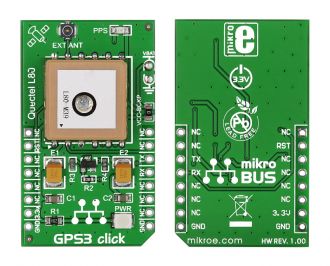
We strongly encourage users to use Package manager for sharing their code on Libstock website, because it boosts your efficiency and leaves the end user with no room for error. [more info]

Rating:
Author: MIKROE
Last Updated: 2019-01-22
Package Version: 1.0.0.1
mikroSDK Library: 1.0.0.0
Category: GPS/GNSS
Downloaded: 8928 times
Followed by: 7 users
License: MIT license
Simple example which demonstrates usage of the GPS3 Click board with QUECTEL L80 GPS module.
It displays a map of the world on the GLCD and shows the location of the GPS module on it.
Do you want to subscribe in order to receive notifications regarding "GPS 3 click " changes.
Do you want to unsubscribe in order to stop receiving notifications regarding "GPS 3 click " changes.
Do you want to report abuse regarding "GPS 3 click ".

Front and back view of GPS3 Click board designed in mikroBUS form factor. mikroBUS is specially designed pinout standard with SPI, I2C, Analog, UART, Interrupt, PWM, Reset and Power supply pins.
View full image